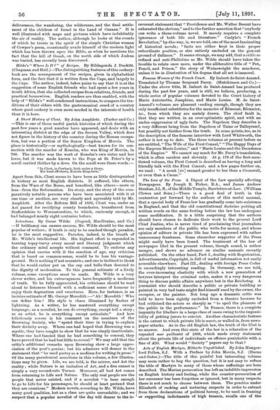The Law of the Press. A Digest of the Law
specially affecting Newspapers. By Joseph R. Fisher, B.A., and James Andrew Strahan, LL.B., of the Middle Temple, Barristers-at-Law. (William Clowes and Sons.)—There is a good deal of truth in the contention put forward by the authors of this useful manual, that a special body of Press-law has gradually come into existence in England, and that the old constitutional doctrine putting all written words on the same footing before the law has undergone some modification. It is a little surprising that the authors should have chosen to dedicate their work to the present Lord Chief Justice, who is never tired of proclaiming that journalists are only members of the public who write for money, and whose opinion of editors in private life has been expressed with rather unnecessary frankness. Some stauncher supporter of the Press might easily have been found. The treatment of the law of newspaper libel in the present volume, though sound, is rather meagre, and shows no advance on similar manuals recently published. On the other hand, Part I., dealing with Registration, Advertisements, Copyright, is full of useful information not easily accessible elsewhere. Part III., dealing with foreign Press Codes is exceedingly interesting reading. In Germany, we are told, the ever-increasing elasticity with which a new generation of lawyers interpret the criminal codes, makes it a very dangeroua thing to discuss public affairs anywhere but in the Reichstag. A_ journalist who should describe a public or private building as painted in very bad taste might find himself sued by the owner, the occupier, or the painter. Not long ago a dramatic critic was held to have been rightly excluded from a theatre because he had criticised the actors so sharply as "to spoil the pleasure of the public in the performance." In France, there is a complete impunity for libellers in a large class of cases owing to the impossi- bility of getting jurors to convict. Another characteristic feature is the extent to which private life is tauree, or walled in, from news- paper attacks. As in the old English law, the truth of the libel is no answer. And even this state of the law is a relaxation of the repealed fnur guilloutet of 1868, which made every statement about the private life of individuals an offence punishable with a. fine of .820. What would " Society " papers say to that ?


































 Previous page
Previous page